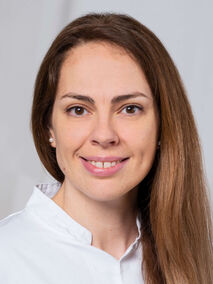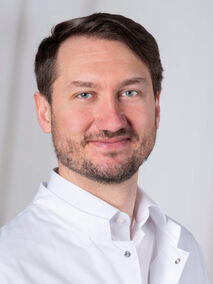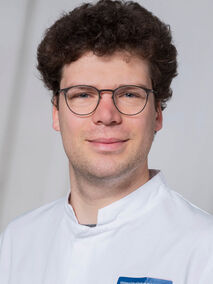Research on Pancreas Inflammation and Precancerous Pancreatic Lesions – Dugic Group
The group has a strong focus on acute and chronic pancreatitis, as well as pancreatic precancerous lesions, from a clinical and epidemiological perspective. Our primary goal is to identify risk factors and patient subgroups that have a particularly high risk of severe pancreatic disease outcomes, including chronic pain, diabetes mellitus, and pancreatic cancer. With access to detailed long-term follow-up studies, we are uniquely positioned to conduct high-quality studies on the progression and outcomes of pancreatitis. Other research interests include pancreatic cancer, screening individuals at risk for pancreatic cancer, the gut microbiome in pancreatic diseases, and aspects of public health. Our team comprises clinicians, medical students, and research nurses, fostering a collaborative and interdisciplinary environment. We have several collaborations with other groups at UKHD, as well as an extensive national and international network.
Scientists

Jan Kleilein
Cooperation Partners
- Karolinska University Hospital, Stockholm, Sweden (Prof. J.-M. Löhr, Prof. M. Vujasinovic, Prof. H. Hagström)
- Aalborg University Hospital, Aalborg, Denmark (Prof. A. M. Drewes, Prof. S. S. Olesen)
- University of Pittsburgh Medical Center, Pennsylvania, USA (Dr. A. E. Phillips)
- Johns Hopkins Hospital, Baltimore, Maryland, USA (Prof. V. Singh)
- All India Institute of Medical Sciences, New Delhi, India (Prof. P. Garg)
- Leiden University Medical Center, Leiden, the Netherlands (Prof. M. van Leerdam)
- University College London, London, UK (Dr. P. M. Acedo)
- University Hospital Halle, Halle (Saale), Germany (Prof. J. Rosendahl, Dr. M. Damm)
- University Hospital Göttingen, Göttingen, Germany (Prof. A. Neeße)
- University Hospital Schleswig-Holstein, Lübeck, Germany (PD Dr. K. Honselmann)
- University Hospital rechts der Isar, TUM, Munich, Germany (Dr. C. Mota-Reyes)
- German Cancer Research Center (DKFZ), Heidelberg, Germany (Dr. F. Canzian)
Projects
We are currently involved in numerous scientific projects. A few of the major projects are briefly outlined below.
Long-term follow-up of patients with acute and chronic pancreatitis (HeiPankReg Study)
Heidelberger Pancreatitis Registry Study (HeiPankReg) – We have access to one of the largest cohorts globally of patients with acute and chronic pancreatitis, including a particularly large subset of patients with autoimmune pancreatitis. Additionally, the registry is intricately linked to a biobank, allowing for the collection and analysis of biological samples that complement clinical data, thereby enriching our understanding of pancreatitis at both the molecular and clinical levels. Several sub-studies are currently ongoing.
Pancreatic pain
Our group is part of the Pancreatic Pain Consortium (https://pancreaticpain.org), an international collaboration focused on understanding and characterizing pain in pancreatitis. Additionally, our group is actively contributing to the ongoing development of pan-European guidelines on pain management in acute pancreatitis.
In partnership with international collaborators, the Pancreatic Pain Consortium has refined the protocol for pancreatic quantitative sensory testing (P-QST) and incorporated it into ongoing prospective studies. Chronic pancreatitis patients identified with P-QST as having widespread hyperalgesia had higher pain intensity scores, higher prevalence of constant pain, and decreased quality of life. Multiple studies are currently underway to validate these findings.
Diabetes mellitus secondary to pancreatitis
Pancreatogenic diabetes, also known as “type 3c” or “post-pancreatitis diabetes mellitus” (PPDM), is a secondary form of diabetes associated with exocrine pancreatic disease. It frequently complicates pancreatitis, affecting up to 80% of patients over the course of their disease. Furthermore, patients with PPDM are frequently misdiagnosed and treated as type 2 diabetes. This is problematic as PPDM has a distinct pathophysiology and clinical presentation. Hence, patients with PPDM often have “brittle diabetes” characterized by fluctuating blood glucose levels, frequent hypoglycemic episodes, and poor glycemic control. However, there is a lack of systematic investigations of glucose homeostasis in relation to PPDM. In collaboration with investigators from Aalborg University Hospital in Denmark, we are studying the prevalence of risk factors for, and awareness of hypoglycemia using standardized patient-reported outcomes. The project will provide novel information on glucose variability and prevalence of hypoglycemia among patients with PPDM using the most updated classifications and technologies.
The gut microbiome and pancreas inflammation
The gut microbiome is increasingly acknowledged for its impact on human health and disease. Emerging evidence suggests that gut microbial imbalance, known as dysbiosis, is linked to various pancreatic disorders. While the causative nature of these associations remains unclear, there is a hypothesis that gut dysbiosis may trigger proinflammatory responses in the pancreas. Patients with acute pancreatitis are more likely than healthy volunteers to have gut dysbiosis. These preclinical and human studies that implicate a role for intestinal dysbiosis in the pathogenesis and severity of acute pancreatitis raise the question of whether modulating the gut microbiome might be beneficial.
We are currently involved in P-MAPS II Study: Pancreatitis- Microbiome as Predictor of Severity – a prospective multicenter clinical-translational study to discover early microbiome biomarkers that predict severity of acute pancreatitis.
Pancreatic cysts
The Department of Medicine IV at UKHD is actively involved in the GerPaCyst Study. The German Pancreas Club Cyst Registry (GerPaCyst) is a web-based platform designed to collect patient-specific characteristics following the diagnosis of a pancreatic cyst. This includes various cystic neoplasms of the pancreas, such as IPMN (intraductal papillary mucinous neoplasm), MCN (mucinous cystic neoplasm), SCN (serous cystic neoplasm), and SPN (solid pseudopapillary neoplasm). GerPaCyst aims to create a collaborative, prospective registry spanning multiple centers and disciplines, focused on understanding the unique biological characteristics of pancreatic cysts. From this knowledge, the registry aims to develop a personalized risk model to better estimate individual malignancy potential.
Pancreatic cancer screening study
Our research group studies familial risk factors and genetic causes of pancreatic cancer. As part of a pan-European network focused on germline mutations linked to pancreatic cancer risk, we aim to enhance genetic counseling and develop effective screening methods for early detection and prevention.
It is estimated that up to 10% of pancreatic cancer cases arise in individuals with a strong family history or carriers of a germline mutation, referred to as high-risk individuals, for which surveillance is recommended.
For instance, persons with BRCA1, BRCA2, or PALB2 mutations, and those with a high family risk for pancreatic cancer, may benefit from screening. Persons with Peutz-Jeghers syndrome (STK11 gene mutations), CDKN2A/p16 mutations, or hereditary pancreatitis (PRSS1 mutations) are at particularly higher risk and should consider screening irrespective of their family history. Individuals with Lynch syndrome or ATM gene mutations should consider screening if they have a family history of pancreatic cancer. We maintain a registry and perform surveillance of high-risk individuals at our Pancreas Outpatient Clinic.
Open positions
We are always looking for talented physician scientists, PhDs or tentative MD (Dr. med.) candidates to help us improve our understanding of pancreatic diseases.
If you are interested, please contact our group leader: Dr. med. Ana Dugic
Doktorarbeit
Klinische Doktorarbeit – The natural course of pancreatitis across different etiologies (Deutsch oder Englisch)
Anbieter: Medizinische Klinik IV– AG Dugic
Doktorvater: Prof. Dr. med. Patrick Michl
Betreuerin: Dr. med. Ana Dugic
Kontakt: ana.dugic(at)med.uni-heidelberg.de
Startzeitpunkt: Zeitnah nach Absprache
Voraussichtliche Dauer: Klinische Phase 6 Monate zur Datenerhebung, dann 3 Monate zur Auswertung und Schreiben der Doktorarbeit.
Davon in Vollzeit: Mindestens 1 Semester
Art der Arbeit: Klinisch-retrospektiv, klinisch-prospektiv
Sprache der Arbeit: Deutsch oder Englisch
Methoden: Retrospektive und prospektive Datenerhebung von klinischen, bildmorphologischen sowie laborchemischen Daten von Patienten mit Pankreaserkrankungen, umfangreiche Datenanalyse, wissenschaftliche Literaturrecherche zur Einordnung der Daten in den wissenschaftlichen Kontext.
Zielsetzung: Das Ziel der Studie besteht darin, die Krankheitsverläufe von Patienten mit Pankreaserkrankungen an der Universitätsklinik Heidelberg zu erfassen und zu charakterisieren. Hierbei liegt der Fokus auf der Identifizierung von Risiko- und Prognosefaktoren für die Krankheitsprogression und das Auftreten von Komplikationen. Ein weiteres Ziel ist die Vertiefung des Verständnisses hinsichtlich der Pathogenese und der natürlichen Krankheitsentwicklung bei verschiedenen Ätiologien der Pankreatitis.
Strukturierte Betreuung:
- Engmaschige Betreuung im Rahmen unserer jungen und sehr forschungsaktiven Pankreatitisgruppe (wöchentlicher „jour fixe“ mit Betreuerin)
- Kurzfristige Absprachen bei Fragen und Problemen
- Klinischer Einblick in die Medizinische Klinik IV und assoziierte Abteilungen
- Eigenverantwortliche Mitgestaltung des Themas und Möglichkeit des Einbringens eigener Ideen und Fähigkeiten
- Möglichkeit der Präsentation eigener Daten auf Kongressen
- Beteiligung an resultierenden Publikationen
Anforderungen: Wir suchen eine/n Doktorand/in, der/die bereit ist, mindestens ein Semester in Vollzeit an einem spannenden wissenschaftlichen Projekt zu arbeiten. Zusätzlich besteht die Möglichkeit, als Studienarzt/-ärztin an unserer laufenden Schmerz-Studie teilzunehmen. Fließende Deutsch- und Englischkenntnisse sind erforderlich. Statistische Kenntnisse sind von Vorteil, aber nicht zwingend erforderlich.
Autorenschaft: Beteiligung an Publikationen mit Möglichkeit für Co- und Erstautorenschaft geplant.











